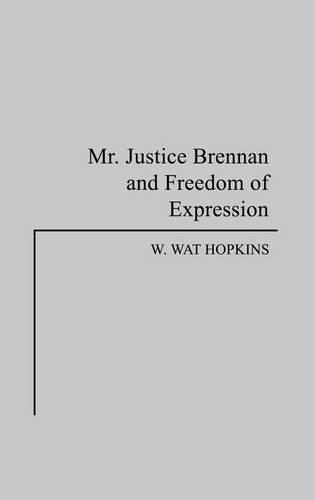
Mr. Justice Brennan and Freedom of Expression
(Hardback)
Publishing Details
Mr. Justice Brennan and Freedom of Expression
By (Author) W. Wat Hopkins
Bloomsbury Publishing PLC
Praeger Publishers Inc
28th August 1991
United States
Classifications
Tertiary Education
Non Fiction
347.302853
Physical Properties
Hardback
208
Description
On July 21, 1990, Associate Justice William J. Brennan, Jr., announced his resignation from the nation's highest court. The judicial career of the man who Wat Hopkins considers the United States Supreme Court's premier protector of expression came to an end. Hopkins examines the body of Justice Brennan's free expression jurisprudence and shows how Justice Brennan's theory of free expression was built on the metaphor of a marketplace of ideas. Hopkins' analysis is based primarily on an examination of the significant free expression cases during Brennan's thirty-four year term. He concludes that Brennan developed a philosophically sound First Amendment theory that was accepted by the Court, but is not being applied today with the force necessary to make it truly effective. This detailed examination of Justice Brennan's jurisprudence is a noteworthy addition to legal history and scholarship.
Reviews
Although he admittedly conducted his research with a touch of hero worship, Hopkins has confined his analysis to the written evidence rather than engage in speculation. The result is a valuable addition to legal history scholarship.-Journalism Quarterly
One of the first studies of the entire Supreme Court career of Justice William Brennan, if only in one field of adjudication. Hopkins examines Justice Brennan and the Court on seven aspects of freedom of expression: pornography, anticommunist witch-hunting, prior restraint, libel, expressive conduct, regulated speech, and free press. Each facet has a chapter of the book, with critical examination of the primary cases. Effective use of Justice Brennan's case files gives insights into the politics of opinion writing. Justice Brennan comes through as a very hard-working intellectual, struggling to develop constitutional theories and in effect lead the Court. A sound study of part of the work of one of the most influential and effective justices in the history of the Court. Written in an easy style, heavily documented, with an appendix of Brennan opinions, plus two good indexes and a bibliography. Highly recommended for public, college, university, and law libraries.-Choice
"Although he admittedly conducted his research with a touch of hero worship, Hopkins has confined his analysis to the written evidence rather than engage in speculation. The result is a valuable addition to legal history scholarship."-Journalism Quarterly
"One of the first studies of the entire Supreme Court career of Justice William Brennan, if only in one field of adjudication. Hopkins examines Justice Brennan and the Court on seven aspects of freedom of expression: pornography, anticommunist witch-hunting, prior restraint, libel, expressive conduct, regulated speech, and free press. Each facet has a chapter of the book, with critical examination of the primary cases. Effective use of Justice Brennan's case files gives insights into the politics of opinion writing. Justice Brennan comes through as a very hard-working intellectual, struggling to develop constitutional theories and in effect lead the Court. A sound study of part of the work of one of the most influential and effective justices in the history of the Court. Written in an easy style, heavily documented, with an appendix of Brennan opinions, plus two good indexes and a bibliography. Highly recommended for public, college, university, and law libraries."-Choice
Author Bio
W. WAT HOPKINS is Assistant Professor of Communication Studies at Virginia Polytechnic Institute and State University. He is author of Actual Malice: Twenty-five Years after Times v. Sullivan (Praeger, 1989). He teaches communications law and has published articles in Journalism Quarterly, Journalism Monographs, West's Education Law Reporter, and Newspaper Research Journal.
